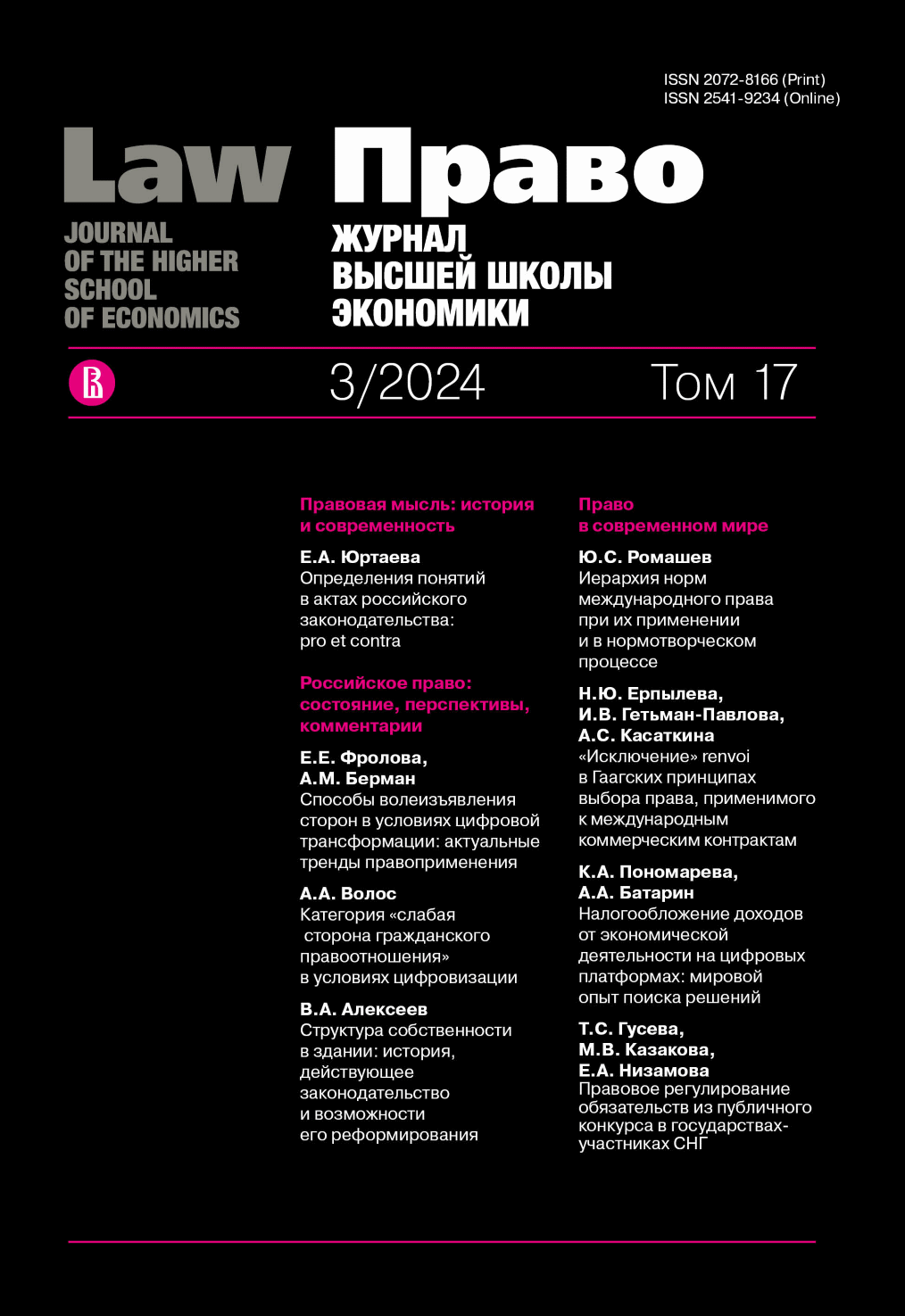Способы волеизъявления сторон в условиях цифровой трансформации: актуальные тренды правоприменения
Аннотация
Авторы рассматривают современные способы волеизъявления сторон в условиях цифровой трансформации и их влияние на практику правоприменения. Особое внимание уделяется таким аспектам, как цифровизация, смарт-контракты, clickwrap, browse-wrap и shrink-wrap соглашения, а также использование биометрической идентификации для совершения сделок. Также подвергается анализу новый тренд — использование эмодзи как замены подписи на договоре. Исследована зарубежная и отечественная судебная практика, свидетельствующая о придании эмодзи юридического значения. Отдельное внимание уделено вопросам кибербезопасности в контексте цифровых сделок. Предложено авторское видение понимания смарт-контрактов, сlick-wrap соглашения, browse-wrap соглашения, shrink-wrap соглашения. Анализируются преимущества и риски использования данных инструментов, а также предлагаются рекомендации к обеспечению правовой действительности, безопасности и эффективности таких цифровых сделок. Прослеживается тенденция кратного роста новых цифровых явлений, заслуживающих правового регулирования, идущих в ногу со стремительным проникновением в сферу имущественных правоотношений технологий, революционизирующих ее принципиально новыми возможностями предпринимательской деятельности. Ими создан диапазон новых категорий, в той или иной мере становящихся объектами правового регулирования или заслуживающими того, чтобы стать ими — «большие данные», «блокчейны», «цифровые активы», «цифровые права» и др. Цифровая трансформация, интегрируясь в предпринимательскую деятельность, качественно изменяет ее. Зачастую весь процесс от момента заключения сделки до ее завершения совершается в электронном виде. Для успеха экономического сотрудничества необходимо создание быстрых и гибких способов разрешения споров. Достигнуть данных целей возможно за счет интегрирования в данный процесс современных информационно-телекоммуникационных технологий. Общей тенденцией в процессе разрешения споров является переход к электронной форме. Анализируется отечественная и зарубежная литература, посвященная выявлению роли и значения права в регулировании отношений, связанных с цифровизацией, и делается вывод, что правовая наука приступила к масштабному и глубокому исследованию содержания и методов регулирования отношений по поводу искусственного интеллекта.
Литература
Dremluga R., Koshel A. (2020) Can artificial intelligence author laws: a perspective from Russia. Journal of Politics and Law, vol. 13, no. 3, pp. 286–295. DOI: https://doi.org/10.5539/jpl.v13n3p286
Ermakova E.P. (2023) Blockchain, metaverses and NFT in civil procedure and arbitration in Russia, China and USA. Vestnik Universiteta Druzhby narodov. Jurisicheskie nauki=Bulletin of People’s Friendship University. Law, no. 1, pp. 148–165. DOI: https://doi.org/10.22363/2313-2337-2023-27-1-148-165
Ermakova E.P., Protopopova O.V. (2023) Digital rights and digital relations. Evraziskiy juridicheskiy zhurnal=Eurasian Law Journal, no. 7, pp. 152–155 (in Russ.)
Gronik I.A. (2023) Transformation of digital dispute resolution methods in India. Vestnik Universita Druzhby narodov. Juridicheskie nauki=Bulletin of People’s Friendship University. Law, no. 4, pp. 1113–1124 (in Russ.) DOI: https://doi.org/10.22363/2313-2337-2023-27-4-1113-1124
Khabrieva T.Ya. (2022) Technological revolutions and their projection in law. Voprocy istorii=Questions of History, no. 2, pp. 256–270 (in Russ.) DOI: https://doi.org/10.31166/VoprosyIstorii202202Statyi33
Kupchina E.V. (2023) Protection of authors’ rights with the help of smart contracts. Evraziyskiy juridicheskiy zhurnal=Eurasian Law Journal, no. 5, pp. 235–238 (in Russ.)
Kupchina E.V. (2023) Protection of rights to digital intellectual property objects. Evraziyskiy juridicheskiy zhurnal=Eurasian Law Journal, no. 8, pp. 133–136 (in Russ.)
Mamychev A.Y., Miroshnichenko O.I. (2021) Legal deontological regulation of artificial intelligence and robotic technologies: current conditions and perspectives In: Modern Global Economic System: Evolutional Development vs. Revolutionary Leap. Cham: Springer, pp. 938–946. DOI: https://doi.org/10.1007/978-3-030-69415-9_104
Miroshnichenko O.I., Mamychev A.Y. (2022) Digital platforms and cloud technologist in post-capitalist discourse: a doctrinal perspective. Smart Innovation, Systems and Technologies. Singapore: Springer, pp. 3–15. DOI: https://doi.org/10.1007/978-981-16-4621-8_1
Osipov G.V., Khabrieva T.Ya. (2022) Digitalization: sociology and law, concept and practice of socialization. Ekonomicheskie strategii=Economic Strategies, no. 1, pp. 6–19 (in Russ.) DOI: https://doi.org/10.33917/es-1.181.2022.6-19
Rusakova E. et al. (2019) Implementation of the smart-contract construction in the legal system of Russia. International conference on education, social sciences and humanities. Istanbul: Ocerint, pp. 748–753.
Rusakova E.P., Khuzzyatov A.A. (2023) Artificial intelligence as a mechanism for fulfilling open contract terms. Evraziyskiy juridicheskiy zhurnal=Eurasian Law Journal, no. 7, pp. 179–184 (in Russ.)
Rusakova E.P., Sergeev K.B. (2023) Foreign experience in the use of digital technologies in civil proceedings. Evraziyskiy juridicheskiy zhurnal=Eurasian Law Journal, no. 7, pp. 214–218 (in Russ.)
Rusakova E.P., Falkina G.Yu. (2023) Approaches to regulation of smart contracts: EU experience. Evraziyskiy juridicheskiy zhurnal=Eurasian Law Journal, no. 10, pp. 47–51 (in Russ.)
Sinitsyn S.A. (2024) International private law: development trends, traditional and civilizational institutions. Zhurnal rossiyskogo prava=Journal of Russian Law, no. 1, pp. 35–52 (in Russ.) DOI: https://doi.org/10.61205/jrp.2024.1.2
Copyright (c) 2024 Фролова Е., Берман А.

Это произведение доступно по лицензии Creative Commons «Attribution-ShareAlike» («Атрибуция — На тех же условиях») 4.0 Всемирная.


















